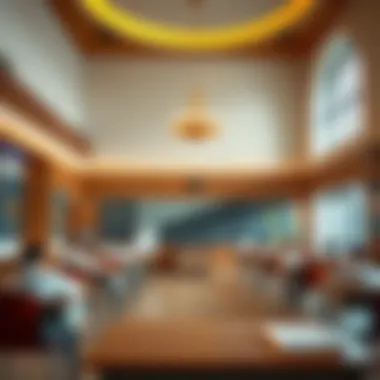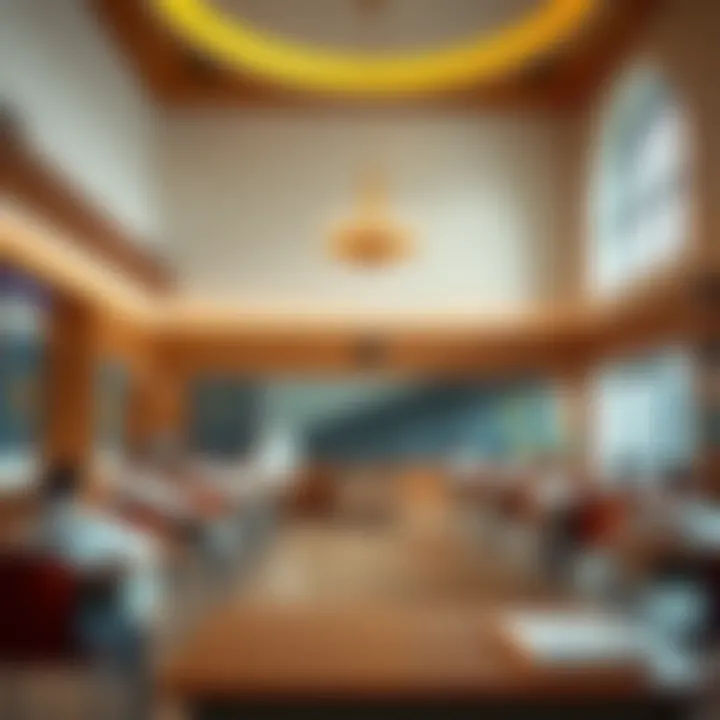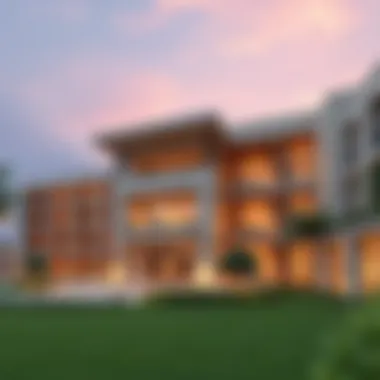Exploring Dubai's Elite Educational Institutions


Intro
In the past decades, Dubai has transformed from a small trading port to a global hub, attracting businesses and families from every corner of the globe. This rapid growth has given rise to a plethora of exquisite educational institutions. Standing proudly are the schools that cater to an elite clientele, with tuition fees that can make eyebrows raise sky-high. This article peels back the layers on Dubai's most prestigious schools, providing insights into what makes them tick, the philosophies they uphold, and the demographics of the students that fill their classrooms.
But it’s not just about the price tag attached to these institutions. The implications of these soaring costs ripple through families, impacting not only their finances but also shaping the overall educational dynamic in Dubai. Parents, investors, and anyone eyeing a slice of the real estate pie can gain value from this comprehensive exploration. Let’s delve into the undercurrents of this elite educational market within Dubai, uncovering the trends, strategies, and nuances that define it.
Preamble to Dubai's Educational Landscape
Dubai has become synonymous with luxury, innovation, and a vibrant multicultural environment. With a rapidly expanding expat community, the demand for high-quality education is ever-increasing. This demand plays a significant role in shaping the educational landscape in the emirate. Understanding how education works in this bustling city can unveil the subtle nuances that affect both families and investors alike.
Overview of the Education System in Dubai
The education system in Dubai is as diverse as its population. Governed by the Knowledge and Human Development Authority (KHDA), it sets standards and frameworks for both public and private schools. Public education is primarily offered in Arabic, whereas private institutions predominantly provide curricula in English, with options like the British, American, and International Baccalaureate systems. This variety caters to a wide range of pedagogical preferences that expat families seek.
Dubai features a mix of international schools and local institutions, allowing parents to choose based on their educational philosophies and values. The public schools tend to follow a more traditional approach, while many private schools incorporate modern teaching methods that encourage critical thinking and personal development. By offering so many choices, Dubai's education system aims to meet the aspirations of its multicultural population, balancing local customs with international standards.
"Education is not preparation for life; education is life itself." - John Dewey
Families looking to settle in Dubai are often faced with a complex decision-making process when it comes to their children's education. Some parents may prioritize affordability, while others may lean towards prestigious international schools, willing to invest significant portions of their income in education. Understanding the educational landscape helps families navigate these waters more effectively, ensuring they make informed choices that align with their values and long-term goals.
The Role of International Schools
International schools have a crucial role in Dubai's educational framework. They not only serve the expat community but also attract local families seeking alternative educational models. Schools like the British School Al Khaleej International and GEMS World Academy offer high-quality education that aligns with global standards, preparing students for a truly interconnected world.
Parents often gravitate towards international institutions for their reputation, rigorous curricula, and a plethora of extracurricular activities. These schools tend to boast impressive facilities that enhance the learning experience, from advanced science labs to well-equipped art studios.
Moreover, international schools provide a familiar environment for expat families, easing the transition into a new culture. The diverse student body fosters a sense of community, as children from various backgrounds form friendships that enrich their social experience. In this melting pot of cultures, students learn not just academic skills, but also invaluable lessons in tolerance and collaboration, preparing them for future global citizenship.
In summary, Dubai's educational landscape is vibrant and multifaceted. With a thorough understanding of the systems in place, families, investors, and educators can better appreciate the nuances that help shape the future of education in this dynamic city.
Defining the Most Expensive Schools
Understanding what constitutes the most prestigious and expensive educational institutions in Dubai can shed light on the evolving educational landscape in the region. With the influx of expatriates and a growing economy, the demand for quality education has escalated, which in turn drives up tuition fees. This section aims to highlight the significance of defining these schools, delve into the particulars of tuition fees, and explore the various factors that contribute to their substantial costs, enabling parents and potential investors to navigate their options wisely.
Understanding Tuition Fees
The tuition fees at elite schools in Dubai can resemble a small fortune. Ranging anywhere from tens of thousands to over a hundred thousand dirhams per year, understanding this landscape of costs is essential for parents. But beyond just the figures, it's about worth. Are those hefty fees translating into superior education, or merely glitter?
Tuition fees generally reflect not just the cost of providing education but also the amenities and resources available at these institutions. For instance, schools like GEMS World Academy or Dubai International Academy offer cutting-edge technology, small class sizes, and a plethora of extracurricular options that encourage holistic student development. These factors are often cited as rationales for the steep prices.
Another important aspect to consider is the differences in fee structures across various school types. For instance, British and American curriculum schools might command different fees based on affiliation and accreditation. Parents often have to weigh these costs against long-term investments in their children’s future.
Factors Influencing Costs
Several elements contribute to why certain schools in Dubai are perched at the top of pricing charts:
- Facilities and Resources: Many of the pricier schools boast state-of-the-art facilities including modern sciences labs, expansive libraries, and sports complexes.
- Student-Teacher Ratios: Lower student-teacher ratios often result in more personalized attention, justifying higher fees.
- Curricular Offerings: Schools that offer International Baccalaureate or Advanced Placement programs tend to charge more due to the complexity and resources needed for these advanced curriculums.
- Reputation and Legacy: Established schools with a history of academic success attract more families, allowing them to leverage this reputation into higher fees.
- Location: Schools located in prime areas of Dubai might have higher operational costs, translating into higher tuition for families.


Considering these factors allows parents and investors to grasp what they are paying for. Ultimately, the challenge lies in aligning educational quality with financial capabilities.
"In education, the desirability of schools often lies beyond just academics—it intertwines with values, community, and future opportunities."
Well-informed decision-making requires an understanding not just of numbers but also of how education fits into a family's lifestyle and aspirations.
A Closer Look at Elite Institutions
Examining elite educational institutions in Dubai provides not just an insight into their prestige, but also into the broader implications for educational approaches, community standards, and real estate dynamics. These institutions do not merely shape curricula; they mold the future of students. Parents investing in these schools often have significant hopes for their children’s academic and social development, thus weaving an intricate web of expectations.
The British School Al Khaleej International
The British School Al Khaleej International is renowned for its robust academic curriculum. It adheres to the British educational system, offering a comprehensive program from early years to A-Levels. Located in a diverse part of Dubai, the school prides itself on developing global citizens while remaining rooted in rich British traditions.
Despite potentially high tuition fees, parents find value in the school’s balanced approach to education, blending academic excellence with emotional and social skills. With innovative teaching methodologies and experienced educators, the school caters not only to the intellectual growth of its students but also provides a nurturing environment.
GEMS World Academy
GEMS World Academy sets the bar high when it comes to international education. Offering the International Baccalaureate curriculum, the school fosters critical thinking and encourages students to explore their passions. Facilities are top-notch, providing extensive resources for arts, sciences, and sports, inviting students to engage in a variety of extracurricular activities.
What really distinguishes GEMS is its emphasis on global citizenship and community involvement. This institution curates a learning environment that’s not only focused on academic excellence, but also character development. Parents often feel a sense of pride having their children part of such a collaborative community.
American School of Dubai
The American School of Dubai is another cornerstone of elite education in the city. This institution adopts an American curriculum, thriving on its broad offerings that span Pre-K through to grade 12. The school’s commitment to fostering innovation and leadership is evident in its extensive Advanced Placement (AP) program.
Parental involvement plays a crucial role here, with families often becoming part of the school's vibrant community. The school emphasizes a well-rounded education, allowing students from varied cultural backgrounds to learn and grow together. The diverse demographics enrich the classroom experience, providing students with a global perspective right from their school days.
Dubai International Academy
Dubai International Academy holds a stellar reputation for its International Baccalaureate offerings. The curriculum here is designed to cultivate adaptable thinking in students through inquiry-based learning. Parents appreciate the school’s dedication to fostering an environment where students are encouraged to ask questions and explore diverse viewpoints.
In terms of facilities, the academy is equipped with state-of-the-art resources, including science laboratories, art studios, and sports complexes. This well-rounded setup ensures that students receive a holistic education. Furthermore, the school champions a community spirit that resonates deeply with families aiming for a nurturing yet challenging atmosphere for their children.
In summary, each of these elite institutions presents a unique blend of academic rigor, cultural diversity, and community focus. The choice of a school in Dubai is not just an academic decision; it reflects the aspirations of families aiming to provide their children with a comprehensive education, thereby impacting their lives far beyond the classroom.
Curricular Offerings and Extracurricular Activities
When looking at high-end educational institutions in Dubai, curricular offerings and extracurricular activities play a crucial role in shaping the overall experience for students. These components are not just add-ons; they are essential in creating a well-rounded educational environment that prioritizes both academic excellence and personal development. It's where students not only gain knowledge but also cultivate skills that set them apart in an increasingly competitive world.
IB and A-Level Programs
The International Baccalaureate (IB) and A-Level programs are two of the most sought-after educational pathways in Dubai's prestigious schools.
A major draw of the IB program is its emphasis on critical thinking and intercultural understanding. Students engage with subjects in a way that promotes a global perspective, helping them to develop skills necessary for success in a diverse world. Schools such as the Dubai International Academy offer the IB diploma, attracting families looking for a rigorous academic curriculum that prepares students for top universities worldwide. This is particularly relevant for expatriate families, as the IB is recognized internationally, easing the transition into higher education.
On the other hand, the A-Level system, prevalent in schools like The British School Al Khaleej International, delivers depth in specific subjects. The focus here is often on specialization, allowing students to hone in on their interests, which can be a double-edged sword. While this caters well to those sure of their career paths, it may provide less flexibility for those still exploring their academic inclinations.
In summary, both programs offer distinct advantages based on the enrollment preferences of families, shaping the academic trajectory of the students accordingly.
Arts and Sports Facilities


Each of these elite schools understands that a student's education is not confined to textbooks. Lovely arts and sports facilities serve as vital components supplementing the core curriculum, building holistic development among students.
Facilities can include state-of-the-art auditoriums for performing arts, studios with cutting-edge technology for visual arts, and sprawling campuses equipped with sports fields, swimming pools, and even climbing walls. The importance of such infrastructure cannot be understated: participation in the arts fosters creativity, while sports encourage teamwork and physical wellness.
Many educational institutions, such as GEMS World Academy, pride themselves on their diverse extracurricular offerings. A student might choose to join a theatrical production, engage in visual art exhibitions, or compete in inter-school sports. These experiences are not merely pastimes; they enhance essential skills like leadership, collaboration, and resilience.
Moreover, strong arts and sports programs attract families who prioritize a balanced education for their children. Investing in schools that provide top-notch facilities is seen as a pivotal factor in a family’s selection process, influencing the price and desirability of real estate in the surrounding area.
Demographics of Students
When analyzing Dubai's prestigious educational institutions, understanding the demographics of their students plays an essential role. This aspect sheds light on the diverse cultural tapestry within schools and how varying backgrounds influence educational experiences. The composition of the student body not only affects daily interactions but also enriches the learning environment, fostering a global perspective among learners.
National and International Student Bodies
Dubai is known for its melting pot of cultures, and that is evident in its international schools. Here, students hail not only from the local emirates but also from various corners of the world such as Asia, Europe, and North America. This geographical diversity means that students bring a wealth of experiences, languages, and traditions into the classroom.
- Many schools conduct comprehensive assessments to ensure that their curriculum is inclusive of these varied backgrounds, thus enhancing social cohesion and understanding.
- For example, common languages spoken within the school setting often include English, Arabic, Hindi, and Chinese, allowing children to communicate and learn from one another seamlessly.
The presence of ambitious students from families that often work in multinational corporations contributes to a competitive yet collaborative academic environment. This competition drives excellence, where students strive to achieve their personal best. The combination of national and international students helps promote cultural awareness and prepares them to navigate a globalized world.
Parental Expectations and Involvement
Parents play a pivotal role in shaping their children's educational journeys, and in Dubai's prestige schools, this involvement becomes particularly pronounced. Families investing heavily in education often have high expectations for their children's performance and future success.
- Involvement Levels: Parents routinely engage in school activities, parent-teacher conferences, and workshops. Many schools encourage an involved parent community, believing it to foster better student outcomes.
- Expectations: Parents might pressure institutions to offer tailored programs that fit their children’s unique needs and aspirations. This demand can range from specific language programs to advanced placement courses.
- Cultural Considerations: Understanding different cultural norms is essential. International parents from various backgrounds might expect different approaches to learning, such as varying degrees of discipline or creativity integrated into the curriculum.
In sum, the demographics of students in Dubai's elite educational institutions significantly influence the educational landscape. The interplay between national and international student bodies, coupled with active parental involvement, creates a vivid and multifaceted approach to education.
"The future is bright for students who learn from each other's diverse perspectives, adapting their understanding to fit a global narrative."
For families considering moving to Dubai, it’s crucial to appreciate how the demographics of educational institutions affect their children’s social interactions and academic environments. Resources like Wikipedia provide further insights into the educational frameworks and demographics in the region.
Financial Implications for Families
In understanding the framework of Dubai's elite educational institutions, it's crucial to consider the financial implications that families face. The steep tuition fees associated with these prestigious schools can dictate not only educational choices but also influence overall family budgets significantly. This section shines a light on budgeting strategies that families might employ to manage these expenses while also addressing the prolonged financial commitments that come with enrolling in long-term educational programs.
Budgeting for Education in Dubai
The task of budgeting effectively for education in Dubai is akin to navigating a financial maze. First off, tuition fees in some top schools can reach upwards of 100,000 AED per year, making it necessary for parents to plan meticulously. For many families, this hefty fee is only part of a larger puzzle. Alongside tuition, parents often grapple with additional costs such as uniforms, textbooks, transportation, and extracurricular activities.
Here are several key considerations for developing a robust budget:
- Tuition Fees: Parents should account for rising tuition rates, which can increase annually. It's wise to research the historical fee increases at specific schools.
- Additional Costs: Extracurricular programs, field trips, and required materials can add to the financial burden. Create a separate line in your budget that takes these extras into account.
- Savings Plans: Many families opt to start saving early. Setting up an education savings fund can mitigate stress down the line. Some banks in Dubai offer specific saving accounts tailored for education.
- Payment Plans: Explore whether schools offer flexible payment options that can spread out the impact of the fees.
Additionally, seeking second opinions from other expat families or consulting real estate agents who specialize in family housing can provide insights. Community forums on platforms like Reddit or Facebook offer a wealth of firsthand knowledge to help families evaluate different schools and share budgeting strategies.
“In the world of Dubai education, a stitch in time saves nine; early planning can alleviate future financial strain.”
Long-term Financial Commitments


The commitment to a prestigious school isn't merely about the immediate fiscal obligations; it stretches across years. As children progress through their education, families may find they need to continue investing not only in tuition but also in ancillary expenses.
Here are several aspects to consider:
- Continuity of Education: If parents start their child in a particular school, transferring schools later may not only disrupt a child's education but potentially lead to increased costs. Schools might charge enrolment fees or require the payment of the full year's tuition upfront if families decide to shift their children mid-year.
- Inflation of Costs: Sticking to long-term commitments can compound financial strain. As mentioned earlier, tuition fees tend to rise at a rate that can outpace general inflation; therefore, it’s essential to factor this into long-term financial plans.
- Career Impacts: For some expatriate families, ensuring the children’s education aligns with future career aspirations can justify high costs. Many elite institutions have strong ties with universities abroad, influencing families to stick to their chosen path even if it stretches budgets.
- Potential Resale of Properties: Families often seek homes in neighborhoods aligned with prestigious schools, hoping to recoup their investment later. However, property trends can fluctuate, so this should be approached with cautious optimism.
Ultimately, carefully navigating these financial implications can lead the way to a more fruitful educational experience for children while maintaining family stability. It becomes a balancing act between ensuring quality education and securing a brighter financial future.
The Impact on the Real Estate Market
When considering the educational landscape in Dubai, it's hard to overlook the correlation between prestigious schools and the real estate market. The influence of elite educational institutions stretches far beyond academic performance; it weaves a complex fabric that affects property values, housing trends, and an overall shift in family dynamics within certain communities. This section explores how elite schools affect local real estate and why this is imperative for investors, expats, agents, buyers, and renters alike.
Property Values Near Elite Schools
In the hustle and bustle of Dubai, proximity to premium schools often equates to higher property values. Neighborhoods that house elite institutions frequently see a marked increase in demand from families seeking quality education options for their children. This phenomenon isn't just a fluke; it can be attributed to several factors.
First and foremost, parents prioritize education when choosing a place to live. They recognize that living near a top-tier school is not only a convenience but also a strategic move that can create a long-term investment in their child’s future. As interest in these areas escalates, property prices inevitably rise.
- Appeal of the area: Properties located nearby prestigious schools tend to attract buyers willing to pay a premium for that convenience.
- Market stability: Homes close to elite schools often retain their value better, even in fluctuating market conditions.
- Community culture: These areas usually nurture a family-oriented environment, making it appealing for like-minded residents.
For instance, neighborhoods surrounding the American School of Dubai or GEMS World Academy frequently witness spikes in real estate activity, adding to their allure as family-friendly destinations. Overall, the significant impact of elite schools on property values cannot be overstated.
Trends in Family Housing
The effects of prestigious educational institutions extend to broader housing trends that surround these elite schools. As families seek optimal educational opportunities for their children, the types of housing available often evolve to meet this demand.
Families with children in top-tier schools tend to prefer larger apartments or villas reflecting their lifestyles. It's not uncommon to see a shift towards luxury developments or gated communities that cater specifically to this demographic. Aside from a premium on property values, several trends can be observed:
- Increase in Family-Oriented Developments: As more families flock to areas near elite schools, developers ramp up construction of family-centric housing.
- Enhanced Amenities: Properties now often feature facilities like swimming pools, parks, and family activity zones to attract buyers.
- Diverse Options: There's a growing variety of housing available, from high-end apartments to spacious villas, aligning with the different needs and budgets of families.
"The proximity to elite schools not only affects buying decisions but shapes the neighborhoods themselves."
These housing trends signify a transformation in how real estate in Dubai's elite school zones is marketed and sold. For potential investors or homebuyers, staying attuned to these shifts is essential for making informed decisions.
In summary, the intersection of elite educational institutions and the real estate market in Dubai offers a fascinating glimpse into how education influences not just individuals but entire communities. Whether one is looking to invest or simply seeking a desirable place to call home, understanding this dynamic can lead to opportunities that go beyond mere academic performance.
End: The Future of Education in Dubai
As we look ahead, the educational landscape in Dubai is poised for transformative change. This section will dissect the ongoing challenges and opportunities facing educational institutions, parents, and the real estate market intertwined with the cosmopolitan area. Understanding how to navigate high costs and diverse student expectations will be crucial in shaping enduring educational quality in this vibrant city.
Sustaining Educational Quality Amidst High Costs
High tuition fees can seem daunting, but they serve a purpose. Schools in Dubai, especially the elite ones, invest in state-of-the-art facilities, cutting-edge technology, and highly qualified instructors. However, maintaining educational quality amid these high costs is imperative.
- Funding Improvement Initiatives: Many schools rely on collected fees to fund continuous improvements in curriculum and facilities. Without a constant stream of resources, their capacity to innovate diminishes.
- Teacher Training and Professional Development: Teachers form the backbone of any educational institution. By investing in their professional growth, schools can ensure that educators remain top-tier, delivering quality education despite the financial pressures.
- Focused Curriculum Development: Schools need to adapt their curriculums to continuously reflect the changing dynamics of the global landscape. Keeping courses relevant and engaging ensures that students receive an education that prepares them for future challenges.
"High costs do not always equate to superior education, but they can fund certain resources that facilitate quality learning experiences if managed wisely."
Exploring Alternatives to Traditional Education Models
As the educational sector evolves, so do the methodologies and models of teaching. Parents and educators are increasingly considering alternatives beyond the conventional school setup.
- Montessori and Waldorf Approaches: These educational frameworks emphasize experiential learning, creativity, and self-discovery. They cater to the needs of children who thrive outside traditional bounds.
- Online and Hybrid Learning Models: Especially popular in recent years, these models offer flexibility, allowing students to learn at their own pace. Some institutions are combining online resources with face-to-face interaction, creating a balanced approach.
- Focus on Lifelong Learning: Schools are now stressing the importance of adaptability and resilience. Fostering skills that allow students to thrive in an ever-changing world is pivotal. Programs dedicated to critical thinking and real-world problem-solving skills can be vital components of this model.
- Collaborative Projects and Experiential Learning: Schools can imbue a sense of community and collaboration by incorporating project-based learning. Students can engage with local initiatives, enhancing their social responsibility while learning.
As education continues to adapt to the demands of a modern world, a more diverse set of options will emerge, enriching the choices available to families in Dubai.



